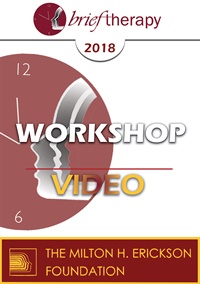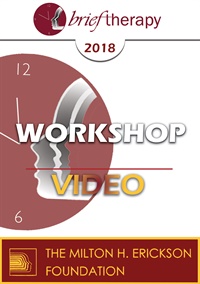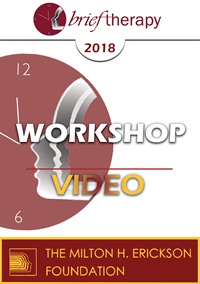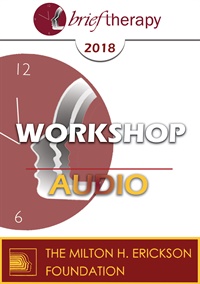
- Average Rating:
- Not yet rated
- Topic Areas:
- Workshops | Brief Therapy | Psychology | Therapist Development
- Categories:
- Brief Therapy Conference | Brief Therapy Conference 2018
- Faculty:
- Michael Yapko, PhD
- Duration:
- 2:04:42
- Format:
- Audio Only
- Original Program Date:
- Dec 07, 2018
- Short Description:
- Cognitive psychology has given rise to new understandings about how people gather and use information. This includes how people decide, usually at a level outside of awareness, what to pay attention to in a given environment and, likewise, what can be deemed irrelevant. One good “how” question can bring into sharp focus what the client doesn’t know—or knows that isn’t so—that’s working against him or her in some debilitating way. This highly practical workshop will focus on the “how” question as a vehicle for identifying the specific discriminations—key elements that distinguish good options from poor ones—that a client can learn to make that will lead to better decisions and a better quality of life.
- Price:
- $15.00 - Base Price
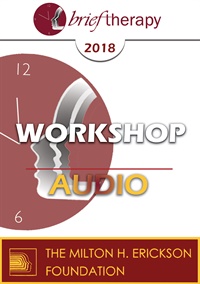
- Average Rating:
- Not yet rated
- Topic Areas:
- Workshops | Hypnosis | Art and Creativity | Brief Therapy | Music | Therapist Development
- Categories:
- Brief Therapy Conference | Brief Therapy Conference 2018
- Faculty:
- Norma Barretta, PhD | Jolie Barretta
- Duration:
- 1:54:14
- Format:
- Audio Only
- Original Program Date:
- Dec 07, 2018
- Short Description:
- We have much evidence that certain sounds reduce stress and pain and aid sleep. Now we are finding that certain sounds speed up the healing process...physiologically as well as mentally and emotionally. When added to hypnosis, the effects are exponential. We will demonstrate various sounds and frequencies and discuss their applications to various health conditions. We will show some graphic visuals of sounds and differences between harmonic sound and distorted sound and how those differences affect us. We presuppose therefore, that the tonal quality and the vibrations in the words produced by the VOICE of the therapist are a factor in the therapeutic process. Adding specific sounds as background enhances and speeds up the healing we seek in therapy sessions. Sound, music and frequencies may indeed be part of the medicine of the future.
- Price:
- $15.00 - Base Price
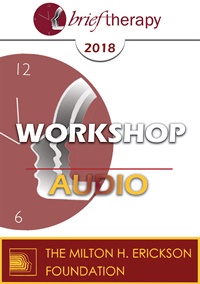
- Average Rating:
- Not yet rated
- Topic Areas:
- Workshops | Anxiety | Brief Therapy | Children and Adolescent Therapy | Depression | Family Therapy
- Categories:
- Brief Therapy Conference | Brief Therapy Conference 2018
- Faculty:
- Lynn Lyons, LICSW
- Duration:
- 2:00:14
- Format:
- Audio Only
- Original Program Date:
- Dec 07, 2018
- Short Description:
- The most frequent complaint I hear from parents about the treatment they receive for their child's anxiety? "No one told us what to DO!" Anxiety is often generational, and by the time a family arrives at your office, they have been in the grips of the cult leader called anxiety for years. Worse yet, many of the things they have been doing, although loving and supportive, are actually making the anxiety stronger. This workshop will describe how to give families immediate and active solutions from the first session, including the use of front loading to provide critical information and understanding, changing the family's relationship with anxiety, and creating active interventions that are often the opposite of what they've typically been doing.
- Price:
- $15.00 - Base Price
Credit available - Click Here for more information
- Average Rating:
- Not yet rated
- Topic Areas:
- Workshops | Psychobiological Approach to Couples Therapy (PACT) | Continuing Education | Brief Therapy | Couples Therapy | Transference / Countertransference
- Categories:
- Brief Therapy Conference | Brief Therapy Conference 2018 | Online Continuing Education
- Faculty:
- Stan Tatkin, PsyD, MFT
- Course Levels:
- Master Degree or Higher in Health-Related Field
- Duration:
- 2:00:42
- Format:
- Audio and Video
- Original Program Date:
- Dec 07, 2018
- Short Description:
- This two-hour workshop deals solely with the matter of projective identification (PI) as experienced in couple therapy. PI is perhaps one of the least talked about and most problematic issue in all modalities of psychotherapy. PI is also one of the most effective tools therapists can use to discover implicit information about the couple and accelerate the therapy forward. Attendees will learn how to become aware of this nonconscious process of communication and defense employed by all couples at some point. Through demonstration and video presentation, attendees will also learn what to do about PI – which strategic interventions will work and how to evaluate their effectiveness.
- Price:
-
Sale is $29.00
price reduced from Base Price - $59.00

- Average Rating:
- Not yet rated
- Topic Areas:
- Workshops | Brief Therapy | Generative Psychotherapy | Psychotherapy | Relationships | Therapist Development
- Categories:
- Brief Therapy Conference | Brief Therapy Conference 2018
- Faculty:
- Robert Dilts, BA
- Duration:
- 2:01:29
- Format:
- Audio Only
- Original Program Date:
- Dec 07, 2018
- Short Description:
- BT18 Workshop 14 - Applying Principles of Generative Coaching to Brief Therapy - Robert Dilts The core focus in Generative Coaching is creativity: How do you create a successful and meaningful work life? How do you create great personal relationships? How do you develop a great relationship with yourself—your body, your past, your future, your wounds, and your gifts? Generative change means creating something beyond what currently exists, whether in personal or professional life. It is not merely a cosmetic change, but a contextual shift that allows new levels of performance. Generative Coaching focuses on how to build the generative states needed to produce change and on how to maintain these states in order transform the obstacles and barriers that will inevitably arise.
- Price:
- $15.00 - Base Price
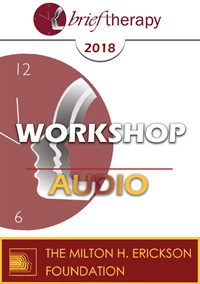
- Average Rating:
- Not yet rated
- Topic Areas:
- Workshops | Single-Session | Brief Therapy | Psychotherapy | Therapist Development
- Categories:
- Brief Therapy Conference | Brief Therapy Conference 2018
- Faculty:
- Michael Hoyt, PhD
- Duration:
- 1:35:35
- Format:
- Audio Only
- Original Program Date:
- Dec 07, 2018
- Short Description:
- Many therapies involve very brief lengths of treatment, including one session. A structure will be presented for organizing the tasks and skills involved in different phases (pre-, early, middle, late, follow-through) of therapy. Numerous case examples, including some on video, will illustrate brief therapy techniques applicable in both initial sessions and in the course of longer treatments.
- Price:
- $15.00 - Base Price
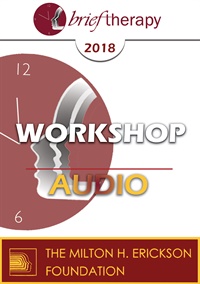
- Average Rating:
- Not yet rated
- Topic Areas:
- Workshops | Brief Therapy | Trauma | Somatic Experiences | Therapeutic Relationship | Pain and Healing
- Categories:
- Brief Therapy Conference | Brief Therapy Conference 2018
- Faculty:
- Janina Fisher, PhD
- Duration:
- 2:05:52
- Format:
- Audio Only
- Original Program Date:
- Dec 07, 2018
- Short Description:
- Traditional models of trauma treatment emphasize a narrative approach centered on the overwhelming events, a very long, slow, painful approach in which clients get worse before they get better. But rather than ‘treat’ the events, neuroscience teaches us how to treat their effects. When trauma symptoms are “decoded” as evidence of how individuals survived, they become comprehensible and treatable. Clients are recruited as active participants in the treatment, are educated to understand trauma-related responses, reassuring them that they are not inadequate or crazy. Best of all, a brief therapy model can be inherently relational while avoiding the 'side effects' of long-term therapeutic relationships.
- Price:
- $15.00 - Base Price
Credit available - Click Here for more information
- Average Rating:
- Not yet rated
- Topic Areas:
- Workshops | Depression | Continuing Education | Brief Therapy | Neuroscience | Psychopharmacology
- Categories:
- Brief Therapy Conference | Brief Therapy Conference 2018 | Online Continuing Education
- Faculty:
- Bill O'Hanlon, MS
- Course Levels:
- Master Degree or Higher in Health-Related Field
- Duration:
- 1:42:03
- Format:
- Audio and Video
- Original Program Date:
- Dec 07, 2018
- Short Description:
- Recent research and insights have given a new understanding of depression, not as a deficit in chemicals, but as a problem with neurogenesis (new brain growth and connection). Antidepressants may work by promoting brain cell and neuronal growth and connection, but there are other ways, within the grasp of therapists, counselors and addiction specialists that can make an immediate and lasting difference in helping relieve depression. This session will give three simple methods for relieving depression using insights from recent brain science.
- Price:
-
Sale is $29.00
price reduced from Base Price - $59.00
Credit available - Click Here for more information
- Average Rating:
- Not yet rated
- Topic Areas:
- Workshops | Brief Therapy | Therapeutic Relationship | Therapist Development | Neuroscience
- Categories:
- Brief Therapy Conference | Brief Therapy Conference 2018 | Online Continuing Education
- Faculty:
- Stephen Gilligan, PhD
- Course Levels:
- Master Degree or Higher in Health-Related Field
- Duration:
- 2:00:04
- Format:
- Audio and Video
- Original Program Date:
- Dec 07, 2018
- Short Description:
- By virtue of our "mirror neurons", it is impossible for therapists to not be deeply touched by client's experiences. We will explore how this can be done skillfully and safely, thereby opening multiple pathways of feedback, compassion, and technical competencies. Special attention will be to mindful activation of the three "minds" of somatic, cognitive, and relational field intelligence, again with the intent of creating a deep and sophisticated conversational connection.
- Price:
-
Sale is $29.00
price reduced from Base Price - $59.00
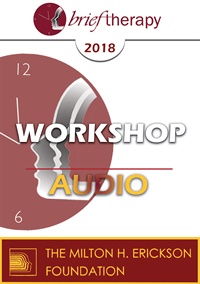
- Average Rating:
- Not yet rated
- Topic Areas:
- Workshops | Brief Therapy | LGBTQ | Multicultural | Trauma
- Categories:
- Brief Therapy Conference | Brief Therapy Conference 2018
- Faculty:
- Rick Miller, MSW
- Duration:
- 1:46:52
- Format:
- Audio Only
- Original Program Date:
- Dec 07, 2018
- Short Description:
- The relationship between gay sons and their mothers is fascinating based on the history of psychiatry pathologizing this bond, suggesting an enmeshment that contributed to the son being gay. Currently, this relationship consists of an empowering bond that contributes to a healthy sense of self in a world where acceptance isn’t necessarily prevalent. The actual key to wellbeing consists of receiving good enough mothering rather than total acceptance of his being gay. This presenter, a gay male author notes that there is little information on this topic, hence the inception Gay Sons and Mothers. This “docuseries” consists of photos and narratives depicting these bonds, video interviews portraying the emotional aspects of their relationships, as well as theory based on interviews and personal experiences.
- Price:
- $15.00 - Base Price
Tags: Gay LGBTQ Multi-Cultural Trauma
Please wait ...


